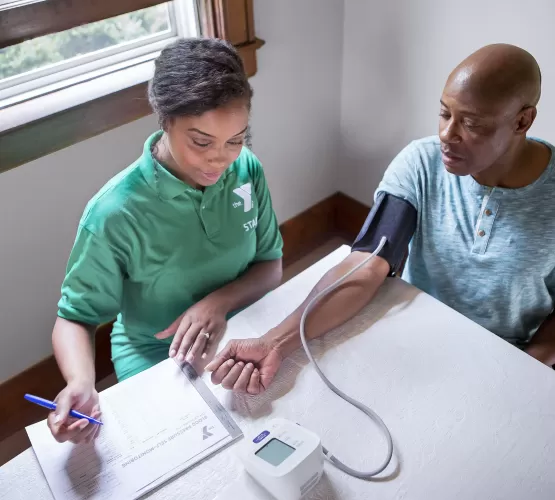Lose Weight, Get Active
If you're at risk for type 2 diabetes, you can make small, measurable changes that can reduce your risk and help you live a happier, healthier life.
The YMCA’s Diabetes Prevention Program gives you the skills you need and the support you deserve to make lasting, healthy lifestyle changes.
Contact Us & Learn More
If you are interested in learning more about the program and participation options, please call 314-598-2120 or email preventdiabetes@gwrymca.org.
By the Numbers

adults in the U.S. have prediabetes.
people aged 65 years or older have prediabetes.
of adults with prediabetes have been told by a health professional.
of those with diabetes engage in the recommended amount of physical activity per week
Frequently Asked Questions
In-person Diabetes Prevention Program options may be available at the following locations:
- Downtown Belleville YMCA: Mondays, 12:15-1:15pm
- Monroe County YMCA: Wednesdays, 2:15pm
- O'Fallon Illinois YMCA: Thursdays, 7pm
- RiverChase YMCA: Mondays, 2pm
- South City YMCA: Wednesdays, 6pm
Can't make it to one of those locations? We are now offering the program virtually!
Current virtual options include:
- Thursdays, 6pm (starting October 23rd)
- Tuesdays, 2pm (starting November 18th)
Yes, there is a program fee. However, some insurance providers cover the cost of the program. In addition, the Y is committed to reducing or covering the cost of the program through financial assistance or grant funding for eligible participants.
Unfortunately, you do not qualify for this program, but the YMCA has other programs and services available that you may qualify for. Click on the links below for more information.
Type 2 diabetes is a disease characterized by high blood sugar, also known as blood glucose. This is your body's main source of energy and primarily comes from the food you eat. Typically, a hormone produced in the pancreas called insulin moves glucose to your cells so that it can be converted to energy. However, with type 2 diabetes, the body either won't produce the right amount of insulin or doesn't use it correctly. Too much glucose will stay in your blood instead of reaching your cells, which leads to health problems such as:
- Increased hunger, thirst and urination
- Fatigue
- Blurry vision
- Numb or tingling feeling in your extremities
- Sores that don't heal
- Weight loss
When you don't take diabetes prevention steps or follow a good care plan, you can end up with heart disease, nerve damage, kidney disease, eye disease and more. Often, you can prevent the onset of type 2 diabetes. Losing weight if you're overweight and keeping it off can prevent or delay diabetes. Also, moving more and eating healthy foods are positive changes.
The YMCA's Diabetes Prevention Program is designed to help those at risk for type 2 diabetes. Our team will work with you to:
- Offer Support and Encouragement
- Set and achieve goals
- Help You Learn Healthy Lifestyles
- Provide Trained lifestyle coaches
Yes! The Y is committed to ensuring healthy living across the region through several evidence-based programs that support those who have been diagnosed with or are at risk of developing chronic conditions such as cancer, diabetes, Parkinson's, and high blood pressure.
Related Blogs

Managing Diabetes and Understanding the Signs
Diabetes is a chronic condition that affects millions of Americans. Take control of your health and learn how to recognize the signs of diabetes in this blog.

Understanding and Managing Blood Pressure and Hypertension
This blog dives into the causes of blood pressure fluctuations, how you can prevent and manage high blood pressure, and tips on blood pressure self-monitoring.

